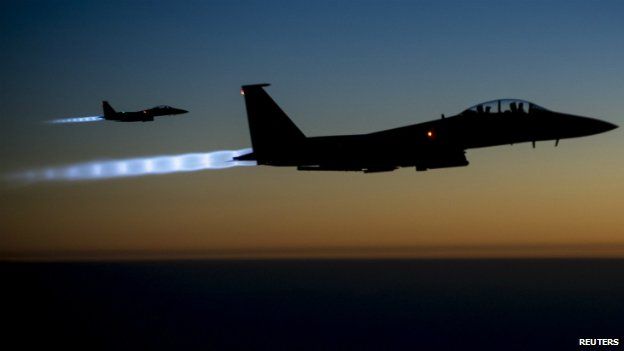US air strikes in Syria 'destroy IS tanks'
- Published

US-led air strikes on Islamic State (IS) militants have destroyed four tanks and damaged another during a fourth night of bombardments in Syria.
The Pentagon said it also carried out seven strikes on IS positions in Iraq, including one on the outskirts of the capital, Baghdad.
The Danish government says it is sending seven F-16 fighter jets to join anti-IS operations - but only in Iraq.
The UK parliament is due to vote on possible air strikes in Iraq on Friday.
The Islamic State is meanwhile advancing on the Syrian border town of Kobane, pushing back Kurdish fighters, reports the Reuters news agency.
Hundreds of protesters stormed the border fence in order to cross into Syria from Turkey to help defend the town, it says.
IS controls much of north-eastern Syria and earlier this year seized swathes of territory in neighbouring Iraq, including the second city, Mosul.
Mark Lowen joined villagers on the Turkey-Syria border watching the fight against IS
After previous US-led air strikes, IS militants beheaded three Western hostages.
Some Western leaders are wary of bombing Syria, as the government there has not asked for foreign assistance against IS, unlike Iraq.
The tanks were destroyed in the oil-rich Deir al-Zour province, the US Department of Defense said in a statement.
It also said strikes in Iraq had destroyed nine IS vehicles and damaged others.
The strikes were carried out by "a mix of fighter, attack and remotely piloted aircraft".
The UK-based Syrian Observatory for Human Rights, which monitors the conflict in Syria, said the new strikes caused casualties but the numbers were unclear.
Recent air strikes have been targeting oil facilities under IS control in both countries in order to reduce its finances.
Yolande Knell spoke to displaced Iraqis in Erbil's Baharka refugee camp
The militant group is earning an estimated $2m (£1.2m) a day from oil sales.
On Thursday, the European Union's anti-terrorism chief told the BBC that about 3,000 Europeans had gone to join armed Islamist groups in the region.
Gilles de Kerchove also warned that Western air strikes would increase the risk of retaliatory attacks in Europe.
Earlier, Spain's interior ministry said Spanish and Moroccan police had arrested nine people suspected of belonging to a militant cell linked to the IS group.
A statement from the ministry said the suspects belonged to a group based in the Spanish enclave of Melilla, on the northern coast of Africa, and the neighbouring town of Nador, in Morocco.
One of those arrested is reported to be Spanish; the rest are Moroccan nationals.
Some 140,000 people are said to have fled the IS advance on Kobane in recent days, crossing into Turkey.
Earlier this week, the UN Security Council adopted a binding resolution compelling states to prevent their nationals from joining jihadists in Iraq and Syria.
US President Barack Obama this week urged other countries to take part in the fight against IS, calling it a "network of death".
More than 40 countries, including several from the Middle East, have offered to join in, US officials say.
In 60 seconds: What does Islamic State want?
- Formed out of al-Qaeda in Iraq (AQI) in 2013, IS first captured Raqqa in eastern Syria
- It captured broad swathes of Iraq in June, including Mosul, and declared a "caliphate" in areas it controls in Syria and Iraq
- Pursuing an extreme form of Sunni Islam, IS has persecuted non-Muslims such as Yazidis and Christians, as well as Shia Muslims, whom it regards as heretics
- Known for its brutal tactics, including beheadings of soldiers, Western journalists and aid workers
- The CIA says the group could have as many as 31,000 fighters in Iraq and Syria